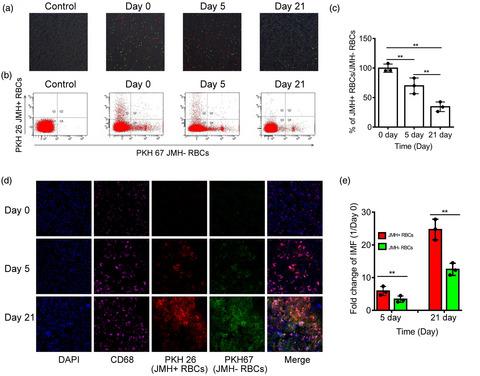当前位置:
X-MOL 学术
›
Clin. Exp. Immunol.
›
论文详情
Our official English website, www.x-mol.net, welcomes your feedback! (Note: you will need to create a separate account there.)
Anti-JMH alloantibody in inherited JMH-negative patients leads to immunogenic destruction of JMH-positive RBCs
Clinical & Experimental Immunology ( IF 4.6 ) Pub Date : 2021-05-22 , DOI: 10.1111/cei.13622 Zhaohu Yuan 1, 2 , Yaming Wei 1, 2 , Xiaojie Chen 1, 2 , Shufei He 3 , Kui Cai 4 , Minglu Zhong 1, 2 , Huiying Huang 1, 2 , Xinxin Tong 1, 2 , Zhen Liu 1, 2 , Xuexin Yang 1, 2
Clinical & Experimental Immunology ( IF 4.6 ) Pub Date : 2021-05-22 , DOI: 10.1111/cei.13622 Zhaohu Yuan 1, 2 , Yaming Wei 1, 2 , Xiaojie Chen 1, 2 , Shufei He 3 , Kui Cai 4 , Minglu Zhong 1, 2 , Huiying Huang 1, 2 , Xinxin Tong 1, 2 , Zhen Liu 1, 2 , Xuexin Yang 1, 2
Affiliation

|
The clinical significance of the specific anti-John Milton Hagen (JMH) alloantibody in inherited JMH-negative patients remains unclear. During clinical blood transfusion, it is often classified as an anti-JMH autoantibody in acquired JMH-negative patients, which might further lead to the occurrence of haemolysis events. In this study, we found that the proportion of inherited JMH-negative people in the Guangzhou population was 0.41%, based on the study of 243 blood samples by flow cytometry. Gene sequencing analysis revealed two novel variants located in exon 11 (c.1348G>A, p.Ala449Thr) and exon 14 (c.1989G>T, p.Leu663Phe). Specific antigen presentation showed that JMH-positive RBCs (red blood cells) could be internalized by SEMA7A−/− dendritic cells (DCs) and that SEMA7A−/− DCs activated by the semaphorin 7a (Sema7a) protein or JMH-positive erythrocytes further induced activation of CD4+ T cells to secrete interferon (IFN)-γ. Transfusion of JMH-positive RBCs could lead to the production of the specific anti-JMH alloantibody in Sema7a knock-out (KO) C57 mice. After erythrocyte sensitization, complement C3 was specifically fixed, causing the destruction of JMH-positive erythrocytes. The anti-JMH alloantibody caused immunological destruction of JMH-positive erythrocytes and promoted the clearance of JMH-positive RBCs. We should be cautious when making conclusions about the clinical significance of the anti-JMH alloantibody.
中文翻译:

遗传性 JMH 阴性患者中的抗 JMH 同种抗体导致 JMH 阳性红细胞的免疫原性破坏
在遗传的 JMH 阴性患者中,特异性抗 John Milton Hagen (JMH) 同种抗体的临床意义仍不清楚。在临床输血过程中,在获得性JMH阴性患者中常将其归类为抗JMH自身抗体,这可能进一步导致溶血事件的发生。在这项研究中,我们通过流式细胞仪对 243 份血液样本的研究发现,广州人群中遗传性 JMH 阴性人群的比例为 0.41%。基因测序分析揭示了位于外显子 11 (c.1348G>A, p.Ala449Thr) 和外显子 14 (c.1989G>T, p.Leu663Phe) 的两个新变体。特异性抗原呈递表明 JMH 阳性 RBC(红细胞)可被 SEMA7A -/-树突状细胞 (DC) 内化,而 SEMA7A -/-由信号素 7a (Sema7a) 蛋白或 JMH 阳性红细胞激活的 DC 进一步诱导 CD4 + T 细胞激活以分泌干扰素 (IFN)-γ。输注 JMH 阳性 RBC 可导致 Sema7a 敲除 (KO) C57 小鼠产生特异性抗 JMH 同种抗体。红细胞致敏后,补体C3被特异性固定,导致JMH阳性红细胞破坏。抗JMH同种抗体引起JMH阳性红细胞的免疫破坏并促进JMH阳性红细胞的清除。在对抗 JMH 同种抗体的临床意义作出结论时应谨慎。
更新日期:2021-07-12
中文翻译:

遗传性 JMH 阴性患者中的抗 JMH 同种抗体导致 JMH 阳性红细胞的免疫原性破坏
在遗传的 JMH 阴性患者中,特异性抗 John Milton Hagen (JMH) 同种抗体的临床意义仍不清楚。在临床输血过程中,在获得性JMH阴性患者中常将其归类为抗JMH自身抗体,这可能进一步导致溶血事件的发生。在这项研究中,我们通过流式细胞仪对 243 份血液样本的研究发现,广州人群中遗传性 JMH 阴性人群的比例为 0.41%。基因测序分析揭示了位于外显子 11 (c.1348G>A, p.Ala449Thr) 和外显子 14 (c.1989G>T, p.Leu663Phe) 的两个新变体。特异性抗原呈递表明 JMH 阳性 RBC(红细胞)可被 SEMA7A -/-树突状细胞 (DC) 内化,而 SEMA7A -/-由信号素 7a (Sema7a) 蛋白或 JMH 阳性红细胞激活的 DC 进一步诱导 CD4 + T 细胞激活以分泌干扰素 (IFN)-γ。输注 JMH 阳性 RBC 可导致 Sema7a 敲除 (KO) C57 小鼠产生特异性抗 JMH 同种抗体。红细胞致敏后,补体C3被特异性固定,导致JMH阳性红细胞破坏。抗JMH同种抗体引起JMH阳性红细胞的免疫破坏并促进JMH阳性红细胞的清除。在对抗 JMH 同种抗体的临床意义作出结论时应谨慎。



























 京公网安备 11010802027423号
京公网安备 11010802027423号